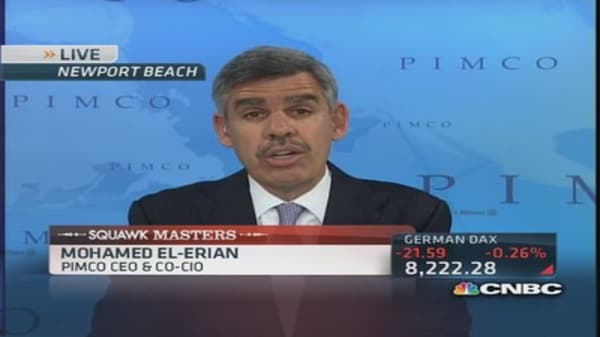1. Like muted reactions to earnings beats, intensified reactions to earnings misses, national retailers telling us consumers are cautious, new home sales disappoint, declining mortgage refinancing, and when stocks have bad breadth (when a smaller group of stocks push the major averages higher while a lot of stocks technically breakdown on the charts).
2. I have never read anything that is specific about what percentage of the stock market rally was due to QE and what percentage was due to fundamentals. Even the most bullish of bulls are pulling in their horns because it is an unknown. And it is probably something many don't want to face. I have little doubt that it is a combo and the answer is below where we are now. I also don't really see much value in recent charts since they were formed during this unusual period.
3. The money holding up U.S. equities right now is emerging market cash running into the arms of American equities as a flight to safety. An analogy is that back in late '99 and early 2000, many small tech stocks were retreating rapidly, but the money was finding a home in Cisco, Lucent, Microsoft, Intel and a few other mega-cap techs stocks as a flight to safety within the sector. It was the pure definition of bad breadth. I think this is happening now regarding the relationship between emerging market equities and U.S. large cap equities. I am not calling for another 2000 or 2007 market crash; this is not my forecast. I believe stocks need to find the equilibrium between fundamentals and Federal Reserveintervention, which is very different than believing the global economy is on the verge of another collapse.
4. The canary in the coal mine to me is JPMorgan Chase. 50 is the critical level, sort of like a Purchase Managers Index, or PMI, for investors. Below 50 and we are seeing the financial sector in contraction.
5. The retail fixed-income investor is the biggest loser in all of this. So many junky fixed-income products were heaved at them in the name of safety and income that they are already stuck. Unfortunately, the preponderance of retail investors deals with loss of value by waiting for their securities to come back. But unless the yield on the 10-year Treasury drops to 1.6 percent again, they're toast. This isn't to say that a defined asset allocation model of equities and fixed income should be thrown out the window, just that for those who gorged on fixed income packaged products and non-traded financial products, may be permanently stuck in a lowered quality of life.
(Read more: Home prices push past rising rates, says report)
6. As emerging market stocks and currencies disintegrate, the central banks of these countries (China being the exception) are going to blow their foreign reserve assets very quickly. Plus, if they raise interest rates or put in capital controls, they damage their local economies (by causing recession) and turn off foreign investors just when they are needed most. This doesn't take away the thesis of a giant emerging economy middle class that wants to live more like us, but it sure can slow things down for a few years.
7. Europe is showing signs of recovery. But outside of Germany, the negative picture hasn't improved much. It helps companies that export to Europe, so there's a plus.
8. Too much reliance on second half strength in the U.S. economy is a dangerous thing. If we get it, it probably won't be great. If we don't get it, we still get tapering. We could have rising rates in a slowing economy. That is the biggest danger we face. It'll mean we are out of bullets. I guess we could get something out of our politicians regarding productive fiscal policy, but I don't rely on fantasy in forming my investment thesis.
(Read more: Larry Summers and the closing of the Obama mind)
9. Banks are raking in the profits, but strip out gains from reversing loan loss reserves and it isn't as great as it looks.
10. Gold investors could be further hurt by capital controls put in place by India on the yellow metal.
11. New Fed head, Obamacare and Syria introduce more uncertainty. This is not a call on whether or not these issues work out well or not, just that at least we won't have long to wait to see.





